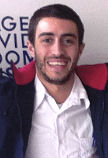A MAJOR LEARNING EXPERIENCE
I decided to do the MDA course because I’ve had a strong interest in emergency health for a while and have been seriously considering it as a career path.
I felt that deciding to get first-hand experience, in a country to which I have such a strong connection, is such a unique and privileged opportunity. Not only does it allow me to explore my curiosity of ambulances and emergency health, it also provides me with the opportunity to be of service to a community of which I’ve become a part in Haifa over the past 7 months.
I was slightly skeptical about how much I could possibly learn in 60 hours of training but, with the perspective of hindsight, I understand that this was only the very beginning of the learning process, as so much is taught and learned in the field.
I remember my first call. It was to a school where a ten year old boy had fallen over and hurt his back. It was pretty clear from the start that there was nothing too serious that had happened to him, however he wasn’t talking or giving any response to our team of medics. I realised then that this position was more than just physically treating a patient. It was about helping them emotionally to feel comfortable and confident that they will be ok.
One of the most interesting calls I had was to a middle aged woman who had chest pain. When we arrived, she had an extremely rapid pulse and arrthymias. It was clear that she was suffering from Angina Pectoris or possibly an MI. So there was only limited treatment that we could give her. But the basic life support team, of which I was a part, played an integral part in providing first response treatment and calm her down as the Natan (advanced life support) was on the way with more intensive medication. When they arrived, it was incredible to watch as they injected the various medications which had an almost immediate effect on her pulse, allowing her to be calm and walk down to the ambulance.
A sad call that I received was to an elderly lady who had fallen over in a park. She had broken her nose and possibly other bones in her face. She was covered in blood and in a state of shock. When we arrived we cleaned her up and took her to the hospital, however, when we got to the hospital and asked if she had family to call, she told us she didn’t – which was quite challenging to deal with as she was in a lot of pain, but had nobody to stand by her side but us. Yet there was only just so long we could stay there before we had to go to another call.
 Ben Zajac
Ben Zajac Ben Zajac
Ben Zajac